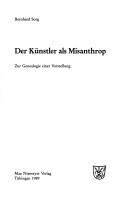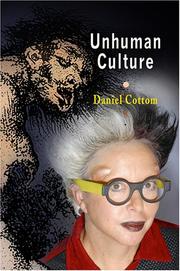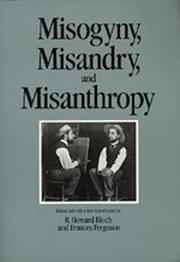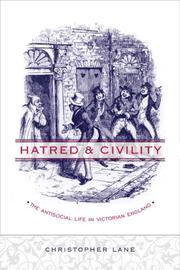| Listing 1 - 8 of 8 |
Sort by
|
Book
ISBN: 1496222628 Year: 2021 Publisher: Lincoln : University of Nebraska Press,
Abstract | Keywords | Export | Availability | Bookmark
 Loading...
Loading...Choose an application
- Reference Manager
- EndNote
- RefWorks (Direct export to RefWorks)
Misanthropoetics explores efforts by Renaissance writers to represent social flight and withdrawal as a fictional escape from the incongruous demands of culture.

ISBN: 3484320516 311094457X 9783484320512 Year: 1989 Volume: 51 Publisher: Tübingen Niemeyer
Abstract | Keywords | Export | Availability | Bookmark
 Loading...
Loading...Choose an application
- Reference Manager
- EndNote
- RefWorks (Direct export to RefWorks)

ISBN: 0812239563 9780812239560 1322510733 0812201698 Year: 2006 Publisher: University of Pennsylvania Press
Abstract | Keywords | Export | Availability | Bookmark
 Loading...
Loading...Choose an application
- Reference Manager
- EndNote
- RefWorks (Direct export to RefWorks)
It is widely acknowledged that the unhuman plays a significant role in the definition of humanity in contemporary thought. It appears in the thematization of "the Other" in philosophical, psychoanalytic, anthropological, and postcolonial studies, and shows up in the "antihumanism" associated with figures such as Heidegger, Foucault, and Derrida. One might trace its genealogy, as Freud did, to the Copernican, Darwinian, and psychoanalytic revolutions that displaced humanity from the center of the universe. Or as Karl Marx and others suggested, one might lose human identity in the face of economic, technological, political, and ideological forces and structures. With dazzling breadth, wit, and intelligence, Unhuman Culture ranges over literature, art, and theory, ancient to postmodern, to explore the ways in which contemporary culture defines humanity in terms of all that it is not. Daniel Cottom is equally at home reading medieval saints' lives and the fiction of Angela Carter, plumbing the implications of Napoleon's self-coronation and the attacks of 9/11, considering the paintings of Pieter Bruegel and the plastic-surgery-as-performance of the body artist Orlan. For Cottom, the unhuman does not necessarily signify the inhuman, in the sense of conspicuous or extraordinary cruelty. It embraces, too, the superhuman, the supernatural, the demonic, and the subhuman; the supposedly disjunctive animal, vegetable, and mineral kingdoms; the realms of artifice, technology, and fantasy. It plays a role in theoretical discussions of the sublime, personal memoirs of the Holocaust, aesthetic reflections on technology, economic discourses on globalization, and popular accounts of terrorism. Whereas it once may have seemed that the concept of culture always, by definition, pertained to humanity, it now may seem impossible to avoid the realization that we must look at things differently. It is not only art, in the narrow sense of the word, that we must recognize as unhuman. For better or worse, ours is now an unhuman culture.
Misanthropy in art. --- Misanthropy in literature. --- Misanthropy. --- Cynicism --- Hate --- Cultural Studies. --- Literature.
Book
ISBN: 9781496222626 9781496223814 9781496223821 9781496223838 1496223837 1496222628 Year: 2021 Publisher: Lincoln, Neb. University of Nebraska Press
Abstract | Keywords | Export | Availability | Bookmark
 Loading...
Loading...Choose an application
- Reference Manager
- EndNote
- RefWorks (Direct export to RefWorks)
Misanthropoetics explores efforts by Renaissance writers to represent social flight and withdrawal as a fictional escape from the incongruous demands of culture.
Poetry --- Drama --- Fiction --- Thematology --- Psychological study of literature --- English literature --- anno 1500-1799 --- Misanthropy in literature.

ISBN: 3704600822 Year: 1987 Publisher: Wien Edition S
Abstract | Keywords | Export | Availability | Bookmark
 Loading...
Loading...Choose an application
- Reference Manager
- EndNote
- RefWorks (Direct export to RefWorks)
Book
ISBN: 0817373152 Year: 1975 Publisher: University, Ala. : University of Alabama Press,
Abstract | Keywords | Export | Availability | Bookmark
 Loading...
Loading...Choose an application
- Reference Manager
- EndNote
- RefWorks (Direct export to RefWorks)
English literature --- Misanthropy in literature --- Satire, English --- Littérature anglaise --- Misanthropie dans la littérature --- Satire anglaise --- History and criticism --- Histoire et critique

ISBN: 0520065468 0585335397 Year: 1989 Publisher: Berkeley : University of California Press,
Abstract | Keywords | Export | Availability | Bookmark
 Loading...
Loading...Choose an application
- Reference Manager
- EndNote
- RefWorks (Direct export to RefWorks)
Misogyny in literature. --- Misandry in literature. --- Misanthropy in literature. --- Women in literature. --- Sexism in literature. --- Misogyny in art. --- Misandry in art. --- Misanthropy in art. --- Woman (Christian theology) in literature --- Women in drama --- Women in poetry

ISBN: 0231503903 0231130643 0231130651 Year: 2004 Publisher: Columbia University Press
Abstract | Keywords | Export | Availability | Bookmark
 Loading...
Loading...Choose an application
- Reference Manager
- EndNote
- RefWorks (Direct export to RefWorks)
To understand hatred and civility in today's world, argues Christopher Lane, we should start with Victorian fiction. Although the word "Victorian" generally brings to mind images of prudish sexuality and well-heeled snobbery, it has above all become synonymous with self-sacrifice, earnest devotion, and moral rectitude. Yet this idealized version of Victorian England is surprisingly scarce in the period's literature--and its journalism, sermons, poems, and plays--where villains, hypocrites, murderers, and cheats of all types abound.
English literature --- Misanthropy in literature. --- Literature and society --- Alienation (Social psychology) in literature. --- Interpersonal relations in literature. --- Manners and customs in literature. --- Courtesy in literature. --- Hate in literature. --- History and criticism. --- History --- England --- Great Britain --- Social life and customs
| Listing 1 - 8 of 8 |
Sort by
|

 Search
Search Feedback
Feedback About UniCat
About UniCat  Help
Help News
News